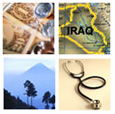 |
|
| Berlin-Brandenburg School Project on the U.S. Presidential Elections 2008 For more information: |
|
ISSUES In 2008, 'family values' are lower on the agenda compared to previous years. Voters and candidates alike have more immediate concerns: the on going U.S. action in Iraq and Afghanistan, nuclear programs in Iran and North Korea, the threat of terrorism, immigration issues and the state of the U.S. economy. Throughout the history of Presidential Elections, presidential candidates have stood or stumbled by their stance on political issues. Despite the powers of personality and popularity, the presidential candidate who wants to win on November 4 must win on the issues as well. This year’s top issues — Iraq, economy, immigration and health care —will heavily influence the election. However, the challenge for Americans voting is to select with care, acknowledging that electing the next U.S. President is not as simple as merely laying out a laundry list of issues and seeing who matches up best. Candidates on the Issues New York Times: The Candidates on the Issues - Where the candidates stand on: National Journal: Presidential Candidates & The Issues - National Journal examines the differences between Democrat Barack Obama and Republican John McCain in a 10-part series looking at their policy records and proposals concerning the major issues in the presidential race. Washington Post: Issue Coverage Tracker - Review press coverage and opinion writing on the presidential candidates and the major issues of the 2008 campaign. CNN: Issues & U.S. Elections Foreign Policy Explainer LA Times: American Values and the Next President - A Times editorial series on the values and issues that will shape the 2008 election. Foreign Press Centers Briefing: Presidential Campaign Update: Overview of the Battleground States & The Key Issues (June 24, 2008) Candidates on Foreign Policy Council on Foreign Relations (CFR): Candidate Positions on Foreign Policy & The Candidates on Immigration America.gov: Top Issues - International Relations Economic Issues Gallup: On Economy, McCain Gains Ground on Obama - 48% of Americans say Barack Obama can better handle the economy, while 45% choose John McCain. This marks a significant gain by McCain; just before the Democratic National Convention in late August, Obama had a 16-point margin over McCain on the economy. Council of Foreign Relations: The Economy Vote - As Democrats and Republicans push into the final stretch of the 2008 presidential elections, economic concerns remain an enigmatic element of the USINFO Podcast: Economic Issues Prominent in 2008 Election Download Podcast (2 MB MP3) Recent polls show that 82 percent of American voters consider economic issues very important. America.gov: Economics Continues to Dominate Presidential Campaign - Candidates use advertising to criticize each other’s economic plans: The 2006 midterm elections, in which dissatisfaction with the war in Iraq helped Democrats gain control of Congress, seemed to indicate that foreign policy would dominate the 2008 campaign. But that has not been the case, and as Election Day nears it seems the economy will remain the dominant issue on voters’ minds. As the number of deaths in Iraq has declined and the coverage of the war by the news media has decreased, Americans are less concerned about the situation overseas and more concerned about their economic situation at home. [...] More (August 15, 2008) The Obama ad "Book" and the McCain ad "Taxman" are available on YouTube Opinion Polls: Democrats and Independents Feel the Economy Will Get Worse in 2008 - As Americans head to the polls in both the primaries and the November general election, one thing that almost certainly will be on their minds is the state of the economy, not only in general terms, but also and probably more importantly, how it is impacting them personally and how they feel about the future. (The Harris Poll #3, January 7, 2008) Read more about the poll. Half of Americans Pessimistic About Economy of Their Region over Next Six Months - Plurality Say Their Household’s Economic Condition has Worsened Compared to a Year Ago. Bad news about the slowing U.S. economy dominates news coverage daily, and it doesn’t appear likely to improve any time soon in the minds of American adults. According to a new nationwide Harris Poll, Americans are not only pessimistic about the economic conditions of their region in the near future, they are only slightly optimistic about their own financial situation looking forward. (The Harris Poll® #27, March 12, 2008) Read more about the poll. Presidential Debates NYT: Presidential Debates Debate Dates • First presidential debate 2008: Friday, Sept. 26, University of Mississippi, Oxford, MS Commission on Presidential Debates - The Commission on Presidential Debates (CPD) was established in 1987 to ensure that debates, as a permanent part of every general election, provide the best possible information to viewers and listeners. | |||
|
|||
| Texts are abridged from U.S. State Department IIP publications and
other U.S. government materials. |
|||
| |
| DISCLAIMER Any reference obtained from this server to a specific commercial product, process, or service does not constitute or imply an endorsement by the United States Government of the product, process, or service, or its producer or provider. The views and opinions expressed in any referenced document do not necessarily state or reflect those of the United States Government. |

